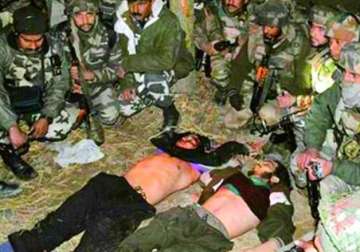Activist denies India's involvement in Baloch 'freedom struggle'
New Delhi: India, despite its strategic interests, has not been forthcoming in support to the Balochistan freedom movement, says a prominent author-activist from the restive western Pakistani province, rebutting Islamabad's allegations that New Delhi

New Delhi: India, despite its strategic interests, has not been forthcoming in support to the Balochistan freedom movement, says a prominent author-activist from the restive western Pakistani province, rebutting Islamabad's allegations that New Delhi was instigating separatist trouble there.
Naela Quadri Baloch, 50, also refuted Pakistan's fresh claims that it had arrested from Balochistan an alleged Indian spy, Kulbushan Jadhav.
"These are all lies. Had India helped us, we could have made a breakthrough and gained our independence. Where are the Indians? We don't see them. They don't come to us," Quadri said on the margins of a talk on Balochistan hosted by Indian think tank Observer Research Foundation (ORF) here.
Jadhav, a former Indian navy officer, was arrested last month. Pakistani envoy in India Abdul Basit claimed that Jadhav's alleged confession recorded in a video "irrefutably corroborates what Pakistan has been saying all along" that India was stirring unrest and destablising his country.
Quadri categorically denied India's involvement. She said Balochis, in fact, want India to get involved and support their fight against the "brutal and barbaric" Pakistani rule in Balochistan.
"India has to take a stand, not only against gross human rights violations in the neighbourhood but also because its strategic interests are involved," said Quadri, the leader of the Balochistan Independence Movement.
Balochistan is a vast territory, the size of France, rich in gas, gold and copper reserves. It is also home to massive untapped sources of oil and uranium. Angry over Pakistan's exploitation of the resources and alleged repressive rule, Balochis have so far launched five armed insurgencies since the territory was annexed by Islamabad in 1948.
There are about seven armed groups currently fighting the Pakistan Army in the region that gets little attention in the country's mainstream media.
Quadri said Pakistan was only interested in Balochistan's resources, and added that Islamabad has involved China and gifted it a share of the resources only to contain India.
She said China's development of the Gwadar port, in the Arabian Sea bordering Balochistan, should be a cause of worry for India. China has also signed an agreement with Pakistan that grants rights to more than 2,000 acres of land in Balochistan for a Chinese company.
"China wants to control the Indian Ocean. Tell me how do you think India will be safe, and trade peacefully in the face of Chinese naval presence on the sea route," Quadri said, adding, "Isn't this enough for India to help us drag the army out of Balochistan?"
Asked what precisely she wanted from India, the activist said she was looking for "every possible support".
"Be it diplomatic, financial or armed. We need it badly. Every kind of support," said the Harvard graduate, who was once allegedly injured on the head during a clash with the army. The injury claimed the vision of her right eye.
She said if India could do it in Bangladesh "why not Balochistan".
"India is not what it was in 1971 (when Bangladesh was liberated). You had a strong headed and brave leader in Indira Gandhi. She was determined and had a tough foreign policy to deal with Pakistan. Unfortunately, the case is different now."
She hoped that Prime Minister Narendra Modi would come off "as strong as Gandhi" to help Balochistan win its "freedom".
"Modi has a popular mandate and I am sure Indian people would support the Balochistan initiative," said Quadri, an activist since her early childhood.
She accused Pakistan of genocide in Balochistan - a region crisscrossed by the borders of Iran, Afghanistan and Pakistan. "They have killed some 200,000 Balochis in the last decade.
"They are using all the eight UN indicators of genocide including dehumanization, polarization, extermination and denial," Quadri asserted.